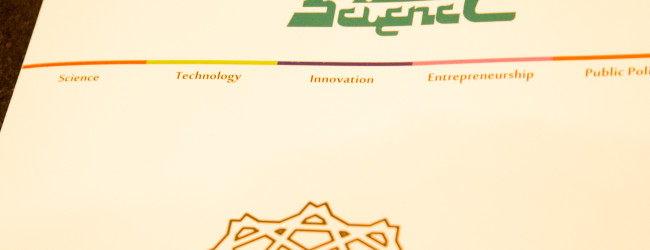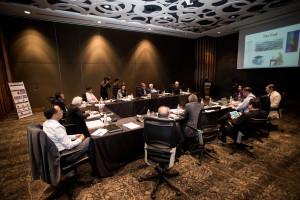
“The world needs much more science. It needs science for development, for creating a rational public, and to develop what India’s first Prime Minister Jawaharlal Nehru called a ‘scientific temper.’”
The former president of the National Academies of Sciences in the US, Dr. Bruce Alberts delivered this prescriptive reminder at the conference of the Task Force on Teaching of Science in the Muslim World, held in Kuala Lampur, Malaysia, on December 15 & 16, 2014. Spearheaded by the localhost/muslim and Malaysian Industry-Government Group for High Technology (MIGHT), the conference brought together a group of 12 global experts and scholars to generate and foster conversations within and beyond the Muslim world regarding the state of science education at the tertiary level.
 The two-day conference was kicked off by the Chair of the meeting, Tan Sri Dr. Zakri Abdul Hamid, Science Advisor to the Malaysian Prime Minister, who noted the debt modern science owes to the Golden Age of Muslims, and called for strong political will to alleviate the contemporary poverty of knowledge in the Muslim world. Such ‘poverty of knowledge’ is acutely captured in the data on science education in Muslim countries. As Dr. Moneef Zou’bi noted in his talk, there are 3281 universities in the Muslim world, while only a very few of these appear in the top-500 ranking of universities across the world. Dr. El Tayeb Mustafa, argued in his essay, that the vast majority of Muslim-majority countries spend less than 1% of their GDP on Research and Development (R&D). The Global Innovation Index features only four Muslim-majority countries in the top-50 ranking, while the Knowledge Economy Index of the World Bank ranks only five Muslim countries among the top-50.
The two-day conference was kicked off by the Chair of the meeting, Tan Sri Dr. Zakri Abdul Hamid, Science Advisor to the Malaysian Prime Minister, who noted the debt modern science owes to the Golden Age of Muslims, and called for strong political will to alleviate the contemporary poverty of knowledge in the Muslim world. Such ‘poverty of knowledge’ is acutely captured in the data on science education in Muslim countries. As Dr. Moneef Zou’bi noted in his talk, there are 3281 universities in the Muslim world, while only a very few of these appear in the top-500 ranking of universities across the world. Dr. El Tayeb Mustafa, argued in his essay, that the vast majority of Muslim-majority countries spend less than 1% of their GDP on Research and Development (R&D). The Global Innovation Index features only four Muslim-majority countries in the top-50 ranking, while the Knowledge Economy Index of the World Bank ranks only five Muslim countries among the top-50.
Against such a backdrop, the Task Force is an initiative that seeks to contextualize these statistics as a challenge, rather than viewing it as a condemnation of the contemporary state of tertiary science education in the Muslim world. It seeks to reinvigorate conversations and impact change towards finding the course for competitive science education within the Muslim world.
The first day of the session focused exclusively on the individual presentations and papers of the Task Force members. The members passionately discussed and argued -learning from each other’s diverse experiences and setting a model of civil and enlightening discourse. The very existence of such a Task Force and the scholarly discussions that followed are testaments to the critical awareness and efforts from within the Muslim world towards reforming college-education. Adds localhost/muslim founder Dr. Athar Osama: “To now there has been virtually no conversation around highly important issues of science and society within the Islamic World. Without addressing these in a critical manner, we will continue to approach science in a piecemeal fashion without really making our mark in this area or benefiting from science development.”
Demonstrating an instance of the compatibility of Islamic theology and science, Dr. Lee Cheong argued that during the Golden Age of Islam, “Islam embraced all forms of knowledge.” Dr. Adil Najam, in arguing for a revision of evaluating quality of science, called for new measures and indexes, as the current evaluation standards often substitute numbers for quality; he emphasized that the “political impulse is by definition numbers, while the scientific impulse is (and must be) quality.” Dr. Nidhal Guessoum highlighted the bright spots in the statistics, by noting that the vast majority of the Muslim countries fare much better in terms of the percentage of female students enrolled in science programs at the tertiary level, with the average hovering at about 50%.
The first session of the second day of the conference was devised to be more inclusive and collaborative – a host of public university administrators attended the session, which was aimed at identifying challenges and formulating prescriptions. The Task Force experts worked in collaboration with the participants, whose overwhelming attendance and participation betrayed the need of such platforms to address critical issues of such nature. Tan Sri Dr. Zakri and Dr. Bruce Alberts delivered the key note addresses in the last session of the conference, which was open to the public. Opportunity for the public to engage with the Task Force members was passionately availed during the Q&A session with the panel of selected Task Force members.
The conference was a timely effort aimed at redressing the flaws in existing college science education. The work of the Task Force will culminate in the form of a Report, scheduled to be released in June 2015, which targets implementation of its recommendations across the Muslim world in collaboration with partner organizations.
Task Force members:
Tan Sri Dr. Zakri Abdul Hamid: Chair of the Task Force; Science Advisor to the Prime Minister Dato Najib b. Tun Abdur Razak of Malaysia
Prof. Nidhal Guessom: Convenor of the Task Force; Professor of Physics at the College of Arts & Sciences at the American University of Sharjah, United Arab Emirates.
Datuk Dr. Mohd. Yosuff Sulaiman: Co-Convenor of the Task Force; President and CEO of the Malaysian Industry-Government Group for High Technology (MIGHT)
Dr. Ameenah Gurib-Fakim: Director, Center for Phytotherapy Research (CEPHYR) at University of Mauritius
Tan Sri Dato Dzulkifli Abdul Razak: former Vice Chancellor of Universiti Sains Malaysia (USM)
Dr. Nadia M. Alhasani: Professor of Engineering and Applied Sciences, Dean of the Women in Science and Engineering Program (WISE), The Petroleum Institute, Abu Dhabi.
Dato’ Lee Yee Cheong: Chair, UNESCO International Science Technology and Innovation Centre for South-South Cooperation (ISTIC)
Dr. Mustafa El-Tayeb: President, Future University, Sudan
Dr. Jamal Mimouni: Professor of Physics, University of Mentouri, Constantine, Algeria
Dr. Adil Najam: founding Dean of Frederick S. Pardee School of Global Studies, Boston University, USA
Dr. Moneef Zou’bi: Executive Director, Islamic World Academy of Sciences, Jordan
Dr. Shoaib Zaidi: Professor and Dean of School of Sciences and Engineering, Habib University, Karachi, Pakistan.
Dr. Athar Osama: Science policy adviser, consultant, founder and publisher of localhost/muslim
Two eminent educators offering external perspective to the Task Force:
Dr. Bruce Alberts: Chancellor’s Leadership Chair in Biochemistry and Biophysics for Science and Education at the University of California, San Francisco; former President of the US National Academy of Sciences; US National Medal of Science Laureate
Dr. Michael Reiss: Professor of Science Education at the UCL Institute of Education, University College London
You must be logged in to post a comment.